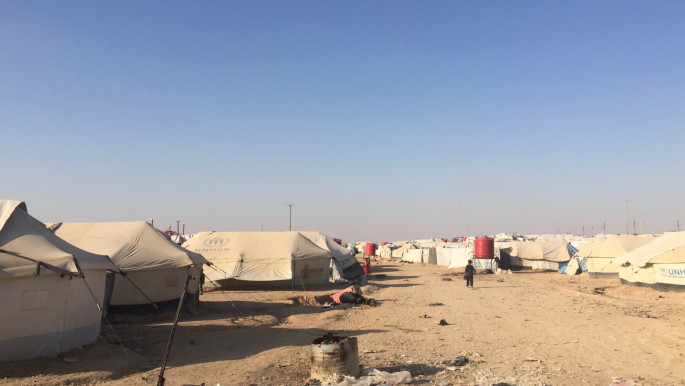Stranded in Syria: The plight of Canada's abandoned citizens
The call for action comes as the Canadian relatives of a five-year-old girl orphaned in Syria filed a lawsuit in Canadian federal court demanding the government intervene to repatriate the child, who holds Canadian citizenship.
Letta Tayler, a senior researcher at Human Rights Watch, said last week that Prime Minister Justin Trudeau's government has "failed its duty" to assist Canadians held in displacement camps and prisons in Syria.
The five-year-old girl, who is known by the name Amira, is currently held in al-Hol displacement camp in northeast Syria, which is under the control of Kurdish forces.
"Failure to intervene in efforts to end these detainees' indefinite, arbitrary detention can in our view amount to failure to protect them against torture given just how horrific the situation is for these detainees," Tayler said during a webinar on 15 July.
"And let's not forget that the majority of them are young children," she added. Human Rights Watch said in a report last month that 47 Canadian citizens, including 26 children, were detained in camps in northeast Syria where they faced harsh and inhuman conditions.
 |
Rights groups say 47 Canadian citizens, including 26 children, are being detained in camps in northeast Syria |  |
Detainees in those camps are suspected of collaborating with the Islamic State group.
"The conditions are inhuman and often life-threatening. There's a lack of food or essential medical care. The water is contaminated. There is sewage and garbage everywhere. Illness is rampant," Tayler said.
The Canadian government has said it is "particularly concerned" about the Canadian children stuck in the camps, but that the current security situation and the Covid-19 pandemic make it difficult to intervene.
"The Government of Canada's ability to provide any kind of consular assistance in Syria remains extremely limited," Sylvain Leclerc, a spokesman for Canada's foreign affairs department, told The New Arab in an email.
 |
|
| Read more: Sheepish on Israeli annexation, Canada should not be rewarded with UN seat |
Leclerc said Canadian consular officials are engaged with Syrian-Kurdish authorities and Ottawa continues "to monitor the situation very closely". He said he could not comment further due to privacy concerns.
But Tayler rejected the government's reasons for not repatriating Canadians stuck in Syria as "flimsy at best".
She and other experts have pointed to other Western countries such as France and the United Kingdom that have brought children back from the camps, saying it proves repatriation is indeed possible.
Fionnuala D. Ni Aolain, UN Special Rapporteur on the promotion and protection of human rights and fundamental freedoms while countering terrorism, said the Canadian children in the camps are blameless.
"Governments have to remind their publics that these children are victims of terrorism," she said during the briefing.
"And if we say that we give sympathy, solidarity and support to victims of terrorism, then we can't pick and choose which victims we're going to decide to support on any particular day."
Aolain pointed to the example of Kazakhstan, which has been open about bringing hundreds of its citizens home from Syrian detention camps.
 |
The return of individuals believed to have supported the Islamic State group in Syria and Iraq has been a point of contention for many governments |  |
The New York Times reported in August 2019 that 548 Kazakhs had returned home. Women undergo a deradicalisation programme upon repatriation. Men can return, too, but they will be arrested and face a 10-year prison term, the newspaper said.
"Countries who have returned (citizens) have been very open" about how they did it, said Aolain. "It's not a secret. These playbooks are available."
Still, the return of individuals believed to have supported the Islamic State group in Syria and Iraq has been a point of contention for many governments after the militant group was routed out of both countries.
A debate has risen around the responsibility of states to collect their citizens from the detention camps and prisons – and bring them to justice for crimes they may have committed in Syria and Iraq.
 |
|
| Read more: Iraq's religious minorities fear plans to resettle IS families |
Some countries have sought to strip their nationals of citizenship and refused to repatriate them, while others have allowed limited numbers to return, usually children and women, but few men believed to have fought with the militant group.
Canadian Prime Minister Justin Trudeau said last month that the prospect of charging and prosecuting citizens for their support for IS upon their return to Canada makes their repatriation "more complicated".
"It is more complicated when we talk about the fact that a number of these people could face charges when they return to Canada for their activities linked to terrorism," he told reporters on 29 June.
But experts have said that repatriation is the only just solution, both for the detainees and for the victims of IS that are still seeking justice for the crimes the group committed.
Currently, about 14,000 foreign nationals from over 60 countries are living in the camps, said Tayler at HRW, of which 8,000 are children, 4,000 are women and 2,000 are men.
If Canada can help bring tens of thousands of its citizens back home due to the Covid-19 pandemic, Tayler said it can certainly repatriate less than 50 Canadians detained in Syria.
"We are at a critical junction here," she said.
"Countries can match their human rights rhetoric with action, or they can create a third-tier system of so-called justice for terrorism suspects and their families. We will do our best to ensure that it is not the latter path."





 Follow the Middle East's top stories in English at The New Arab on Google News
Follow the Middle East's top stories in English at The New Arab on Google News


